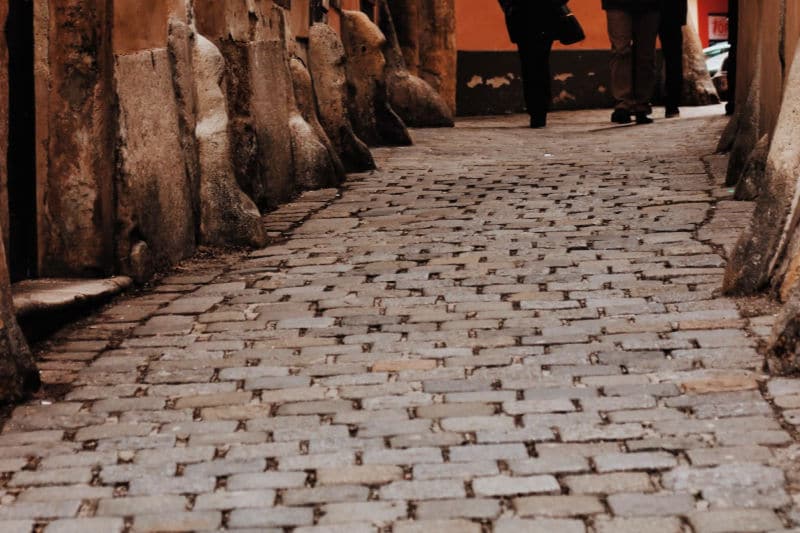If you had told me a year ago that I’d be nearing the end of my first year teaching a high school class, I’d think you’d gone off your rocker. I wasn’t looking for a job, let alone a hard job that requires quite a bit of preparation. I love being self-employed.
But here I am, a few weeks away from completing my first foray into teaching high school English. And I’ve surprised myself how much I enjoyed it.
Now, let me be clear right out of the gate: this is a very part-time job for me, so I’m not remotely comparing what I do with the otherworldly work done by full-time teachers the world over. I only know what I know from my own experience, and it’s been this: teaching a class of 16 high schoolers once a week at a unique, Socratic method, learner-driven school.
I’ll share more this week on the podcast about what I’ve learned about teaching. Here, I’m thinking through what I’ve learned about myself by saying yes to something unexpected.
I was leading my first-ever Literary London when I replied “yes” via email to the woman who’d offered me the role of teaching English to high schoolers a few weeks prior. Looking back, I see the correlation between leaping into the unknown void of leading an international group trip and agreeing to commit weekly to a task I’d never before done. At the time, though, I thought I was just plain nuts.
There was a short season in college when I thought of turning my English major into an education degree I could use in a career. By junior year, though, I realized I was more cut out for writing and research than helping others do the same. So, I added cultural anthropology for a double-major liberal arts degree, and was off to the races.
So when friends, rather out of the blue, asked if I’d be interested in taking on the monumental task of helping teenagers prepare for their future via books and writing, I was overwhelmed at the thought. What’s that maxim about those who can’t do, teach? It felt the opposite to me: those who can’t teach, do.
I said yes anyway. The endorphins from a successful Literary London were pumping through my body, and I chose to replace the feeling of overwhelm with the feeling of privilege. What a privilege it would be to lead these kids through the world of books I love so much. What an honor to do so.

With only a few weeks until the first day of school, I scrambled like mad to create a reading list and basic syllabus for the entire school year (looking back, knowing now what I know, and I can’t believe it all came together as fast as it did). Being a Socratic school, I only needed to think through about 15-30 minutes of actual teaching per week, since the model of asking good questions and helping guide students through their self-driven growth would carry most of the weight.
Still… I had no idea what I was doing. The first day of school felt like cosmically diving into the deep end.
But I learned. And I stumbled through my mistakes, my hiccups, my lack of experience. And I got a little better every week. Here’s what I’m still learning about my own inward growth from the art of teaching.
Practice is a real thing.
We tell this to kids all the time: if something’s hard, just keep practicing. You’ll get there. But it’s just as true for us adults.
I’ve learned this from writing and traveling — I get better at these things the more often I do them. Waiting to get better before I do something is like learning how to lift weights, paint, or speak a foreign language by watching YouTube videos. You can research all you want, but the only way to improve is to get out there and do it, first as a beginner. You stumble and bumble, you feel like a toddler, but eventually, you find your balance and bearing.
The more teaching hours I logged, the better I got. The best way to get better at something in life is to do it regularly.
Admitting what you don’t yet know makes you human.
It felt weird at first, when a student would ask me something I didn’t know, and I’d have to answer, “You know, I’m not sure. I’ll find out.” But they never batted an eye at this response. They didn’t expect me to know everything, because they’re smart, and they know people don’t know everything.

One of my favorite definitions of a reliable mentor is “someone who’s about three steps ahead of you.” They’re not so far down the road that they’ve forgotten what it’s like to be where you are, but they are indeed ahead of you, clearing the way and pointing out the bends in the road. They’re still walking the path, too. They’re still learning how to put one step in front of the other. They’re not perfect in their field. Heck, they very well may have a mentor of their own, three steps ahead of them.
Once you feel like you know everything, you’ve stopped growing. Admitting you’re still learning and you don’t know everything makes you a valuable mentor, not unreliable.
Good questions don’t always require neat, tidy answers.
I was reminded of this last week, as we wrapped up Night by Elie Wiesel. His memoir just… ends. No final thoughts about the meaning of life, tidy reflections on the meaning the Holocaust, on why he endured what he did. It just ends, with him looking in the mirror, unrecognizable to himself having not looked at his reflection since before his internment at Auschwitz. The end.
Sure, it’s sometimes good to look back and extract meaning to some events or circumstances. It’s good to ask if there’s a greater good behind a challenge. It’s good to ask God for whether there’s a reason to things. But those things aren’t always necessary for the steady work of daily life. Perhaps the best way to become a better human is learn to sit with good questions, to ask, to listen, to sit with the waiting.
The older I get, the less black and white I see in the world, and way more gray. It makes the few black and white all the more precious.
Being around people is really good for me…
I’m an introvert. I’m also an enneagram 4w5, which means I can spend all day in my head and enjoy the company. It doesn’t take much people time for me to need to drive back to my station and refuel. Because of these things, writing is a great vocation for me.

The problem is, I need people, and I need to be around them. If I’m not careful, I can go days barely talking to anyone beyond the barista, the librarian, and my family. Teaching once a week has been just the thing I need to get me out of my head and around three-dimensional people.
Not only has it been good for me to remember the intrinsic value of working on something collective with others — a school, functioning well because other adults and students make it so — but it’s made may “main” job even better. Doing something completely different and entirely unrelated to the dubious efforts of “growing an audience,” “building a brand,” or “promoting a platform” (after all, I spend pretty much my entire Wednesday focused on only 16 teenagers) has made my craft as a writer even better.
I write better. I feel like I podcast better. I have a better perspective on the role of social media in my life and work. I have one less weekday to do all my work, so I essential-ize it and get more done that actually matters: more writing, better podcast chats, less Instagramming and more making time for my patrons.
I don’t think I’m exaggerating to say being around 16 teenagers and a few other smart adults has been a game-changer in my work the other days of the week.
…So is saying yes to something hard.
Unless it spins me straight out into my no-good panic zone, I’ve never not found value from saying yes to something hard. Be it leading a group of women in another country, writing a book, starting a thing that may not work, or whatever — saying yes usually means growth.
That doesn’t mean there’s not risk involved. That thing may not work. I’ve said yes to ideas that’ve turned out to not be classically successful. But I grew from them. I learned. I became a better human because of them.
The same has been true with my saying yes to teaching this past year. It’s been hard, but it’s been good.
And so, I’ve said yes to another school year. Am I ready for a summer break? You better believe it. But these kids, they’ve grown on me. I’m glad I said yes.
p.s. At the end of the week on the pod, I’ll share what teaching is teaching me about teaching.



